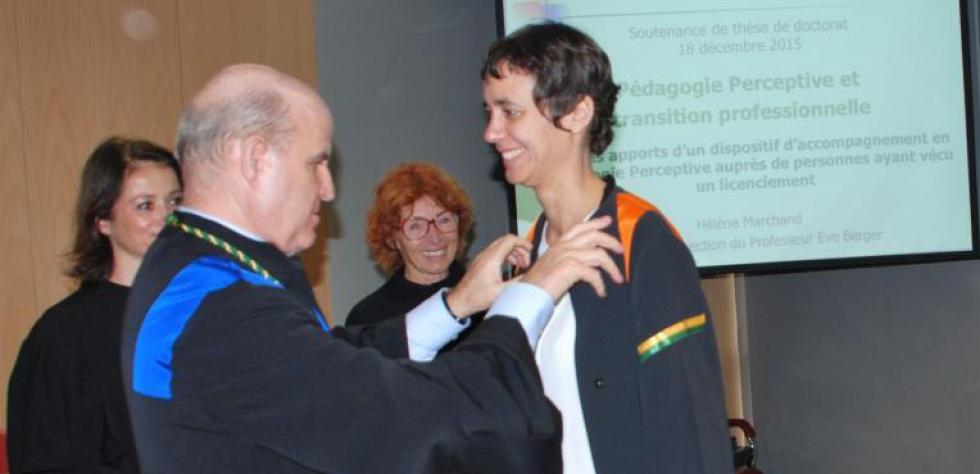The research, from the perspective of a researcher-practitioner, investigates the benefits of a support system using perceptual psychoeducation on a population undergoing professional transition following lay-off. The thesis analyzes social issues such as identity and relationships that impact professional transition and joblessness at a particular moment in a career transition. It then shows how and in what ways the conceptual and practical field of perceptual psychoeducation appears relevant in the support of individuals facing the difficulties and challenges of job loss. A qualitative approach is applied to semi-structured interviews of 11 participants who followed this support system. It included individual manual therapy sessions and sensorial gymnastics classes. The analysis produced 11 phenomenological accounts that reveal the benefits of this support system and the ongoing process of change for each person. A hermeneutical analysis brings to light how participants acknowledged coming into more conscious relationship with their bodily interiority, a process that improved recovery from lay-off. This analysis also highlights how perceptual psychoeducation within this support system successfully met the specific issues of professional transition, such as identity realignment, the construction of self-awareness, capacity building, and the deployment of a stance valuing one’s personhood. The results provide innovative perspectives in the field of social intervention, based on the development of perceptual resources and the adaptive abilities of the individual.
Contextualization
The issue of career transition appears today to be central when it concerns the world of work and career development. The once predictable and progressive career paths are nowadays replaced by heterogeneity, mobility and uncertainty in the face of the future. During his lifetime, the human being is more and more confronted with several planned or unplanned challenges causing changes in his environment to which he will have to adapt.
If these changes can be experienced as a threat in the sense that they jeopardize the person's psychosocial balance, they can also be seen as an opportunity to develop new strategies and broaden one's field of possibilities by drawing on unexploited resources.
This research is based on a specific situation of career transition, the period of unemployment, and studies the contribution of Perceptual Education as a support system for those experiencing redundancy. Indeed, people confronted with unemployment have to deal with various stakes and necessities, with which they are forced to cope. In particular, this includes developing one's employability, a term designating individual capacities to find a job or to remain in it. It also includes the ability of being autonomous and responsible, to have a sense of initiative, the capacity to mobilize adaptational resources in the face of a changeable and unpredictable environment, the ability to invent one’s career, etc. These are high demands for people who are for the majority in a grieving period, identity crisis, a loss of confidence, self esteem and also motivation.
In such a context, considering an accompaniment of the person in his transitional process seems relevant, and perhaps even a necessity.
Perceptual Education is an innovative change support approach resulting from practical and theoretical models developed by Danis Bois PhD. It is based on the development of the person's capacities of perception through an in-depth work on the relationship with the body. On the basis of this perceptive education, Perceptual Education offers the conditions for the development of internal vitality and health resources, but also of learning faculties as well as action and interaction modalities. It facilitates the access to a sense of felt sense, source of new configurations of meaning for one's life (Bois, 2007 ; Bois, Austry, 2007).
Questioning the way in which the person can find internal resources, through the relationship to his body in order to facilitate his adaptational process to his unemployment and job search situation is a key concern of this research.
Methodology
The research was conducted with eleven people who were unemployed following a layoff and who followed a Perceptual Pedagogical support system. The support program consisted of three individual sessions of one hour and a half and five collective sessions of three hours over a total period of two months.
The support program was carried out around objectives such as the recovery of the person’s resources, the consolidation of confidence and self-esteem, the deployment of his potential and singularity in the implementation of his professional project.
The body approach was the main tool of the sessions, using both manual approach for the individual sessions and gestual approach for the collective ones. All sessions were supplemented by verbal restitution thus supporting the integration of what is learned through one's thoughts and life patterns.
The qualitative methodology employed was based on individual semi-structured interviews conducted before and after the monitoring of the program, focusing mainly on the person's experience of his unemployment situation, the dynamics of his job search and the development of his career plan.
The data analysis used a phenomenological methodology case by case, which produced eleven narratives showing the path of each participant in contact with Perceptual Education and the contributions in the management of their transitional situation.
A transversal hermeneutical analysis has brought to light the dynamics and issues of change which characterizes the situations of professional transition experienced by the participants, as well as the procedural modalities by which these changes have manifested themselves.
Résults
The results illustrate how people were able to bounce back after redundancy, through developing a more conscious and assumed relationship with their body perceptions giving them more self-confidence, capacity for action and creativity.
Five processual dynamics were identified, linking specific body experiences with the development of new life attitudes experienced in situations of professional transition.
- The encounter with an internal force which stimulates and reconfigures the motivational system, in connection with one's own aspirations, leading to more perseverance, determination and involvement of oneself in the job search process ;
- The adoption of a more open and straightened posture leading to a gain of confidence in job search, an enhanced assertiveness and improved recognition of one's professional skills ;
- An increased sense of embodiment, which contributes to a more efficient management of daily stress and interviews ;
- The perception of new orientations of body movement contributing to an enrichment of one's modes of job search and an improved ability to seize opportunities ;
- The discovery of a sense of wholeness that derives from mind-body tuning, participating in a better understanding and listening to oneself, and leading to a new definition of one's professional project.
The results also reveal how the support system in Perceptual Education has responded to specific issues of professional transition, according to four main levels :
- A consolidation of the participants' sense of identity, which appears as a support in a transitional situation in order not to get lost in the face of change and to find in oneself the necessary adaptational resources ;
- An evolution of the participants' representations, helping to renew the meaning of their past, present and future journey, the relationship with the body appearing in this context as a reflexive partner
- The acquisition of new skills that can be mobilised in the management of transitional processes
- The deployment of a clearer attitude of the subject leading to an active adaptation to change and the transition from undergoing to choosing (Glee, Scouarnec, 2008).
This research thereby shows that it is possible to rebound in a situation of professional transition and to make unemployment a formative experience. Some participants are thus witnessing a shift in the way unemployment is experienced from a privative model, which analyses the unemployment situation from the point of view of lack, to a proactive model highlighting the subject's potential to act. Therefore, the results obtained enrich the understanding of the transitional processes from the point of view of the subject and his possibilities of deployment in such a situation.
Conclusion
Now that the relevance of support in Perceptual Education in order to help people in career transition to better manage this situation has been highlighted, this research cherishes the hope to contribute towards inscribing this kind of support within structures aiding a return to employment.
More widely, a support and change facilitation centred on the relationship to one's perceptive and bodily resources , as a means of deploying and enriching one's capacities to be and to act should be incorporated beyond the job seeking context, for example in the management of career paths within the company.
Beyond the world of work, this research is a continuation of other works from the CERAP that show how Perceptual Education helps the person develop a clearer attitude of himself, through the learning of new skills and ways of being. It therefore joins different current social issues and shows the necessity for the individual to consider himself as a subject if he wishes to evolve, be in charge of his life course while adapting to the changes and the unexpected punctuating his life trajectory.
Overall, this research opens new perspectives on support and change facilitation aimed at restoring the individual's subjectivity and intentionality in order to better respond to the different issues encountered in the face of societal changes.


